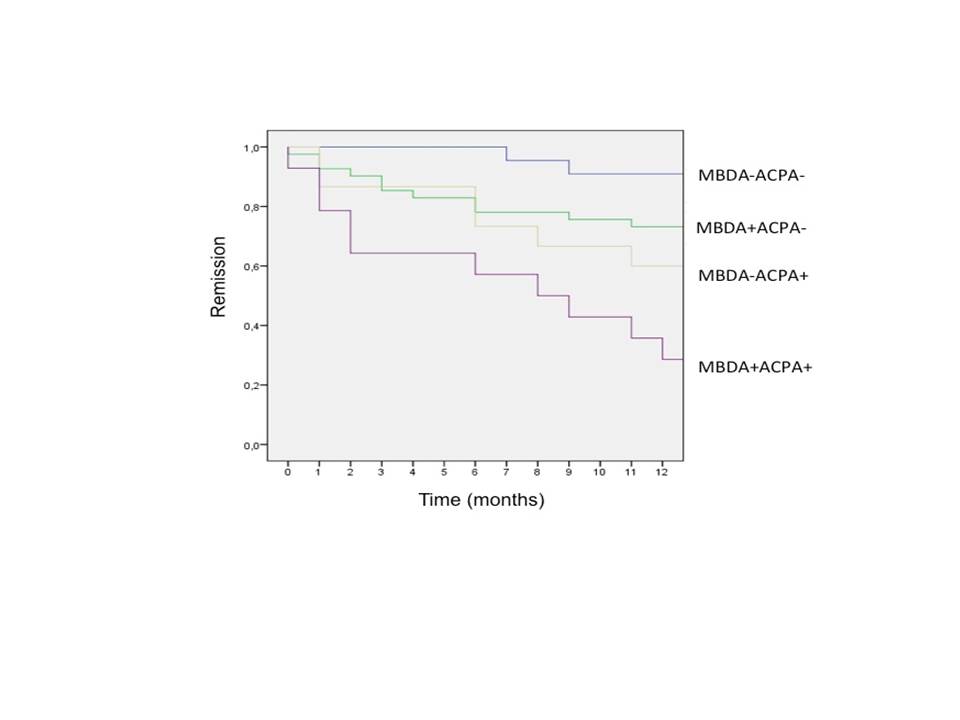Session Information
Session Type: ACR Poster Session C
Session Time: 9:00AM-11:00AM
Background/Purpose: To analyze the role of multi-biomarker disease activity (MBDA) in predicting disease relapses in rheumatoid arthritis (RA) patients in sustained remission, tapering disease modifying anti-rheumatic drug (DMARD) therapy in a prospective randomized controlled trial.
Methods: Twelve individual inflammation markers were analyzed from baseline serum samples of 100 patients from the RETRO study by the standardized MBDA test (Vectra® DA). MBDA scores range from 1-100 and are categorized as low (<30), moderate (30-44) or high (>44). The scores were calculated and compared between patients relapsing or remaining in remission when tapering DMARDs. Demographic and disease-specific parameters were recorded and included in multivariate logistic regression analysis for defining predictors of relapse.
Results: Moderate to high MBDA scores were found in 35% of RA patients, with doubling in patients relapsing (58.3%) than those remaining in stable remission (25%). Baseline MBDA scores were significantly higher in RA patients relapsing than those remaining in stable remission, when analyzing the entire population (N=100; p=0.0034), those tapering (N=36; p=0.0017) or stopping DMARDs (N=28; p=0.0036). Multivariate regression analysis identified MBDA scores as independent predictors for relapses next to anti-citrullinated protein antibody (ACPA) status. Relapse rates were low (13%) in MBDA-/ACPA- patients, moderate in MBDA+/ACPA- (33.3%) and ACPA+MBDA- (31.8%) patients and high in MBDA+/ACPA+ patients (76.4%). (Figure 1)
Conclusion: MBDA score improves the prediction of relapses in RA patients in stable remission undergoing DMARD tapering. If combined with ACPA testing, MBDA allows a correct case classification of relapse in more than 80% of the patients.
Figure 1. Relapse rates of RA dependent on ACPA and MBDA status: Kaplan-Meier curves indicate loss of remission over 12 months in patients with rheumatoid arthritis in relation to ACPA and MBDA status: (blue) ACPA/MBDA double-negative, (green) ACPA+/MBDA-, (yellow) ACPA-/MBDA+ and (purple) ACPA/MBDA double positive. Y-axis indicates the percentage of patients with rheumatoid arthritis in sustained remission (100% at baseline). X-axis indicates time.
To cite this abstract in AMA style:
Rech J, Hueber AJ, Englbrecht M, Finzel S, Haschka J, Manger B, Kleyer A, Reiser M, Tony HP, Kleinert S, Feuchtenberger M, Fleck M, Manger K, Ochs W, Schmitt-Haendle M, Wendler J, Schuch F, Ronneberger M, Lorenz HM, Nüßlein H, Alten R, Cobra JF, Henes JC, Krüger K, Schett GA. Prediction of Disease Relapses By Multi-Biomarker Disease Test Activity in Rheumatoid Arthritis Patients Tapering DMARD Treatment [abstract]. Arthritis Rheumatol. 2015; 67 (suppl 10). https://acrabstracts.org/abstract/prediction-of-disease-relapses-by-multi-biomarker-disease-test-activity-in-rheumatoid-arthritis-patients-tapering-dmard-treatment/. Accessed .« Back to 2015 ACR/ARHP Annual Meeting
ACR Meeting Abstracts - https://acrabstracts.org/abstract/prediction-of-disease-relapses-by-multi-biomarker-disease-test-activity-in-rheumatoid-arthritis-patients-tapering-dmard-treatment/

